Zheyu Chen
Learning and Editing Universal Graph Prompt Tuning via Reinforcement Learning
Dec 09, 2025Abstract:Early graph prompt tuning approaches relied on task-specific designs for Graph Neural Networks (GNNs), limiting their adaptability across diverse pre-training strategies. In contrast, another promising line of research has investigated universal graph prompt tuning, which operates directly in the input graph's feature space and builds a theoretical foundation that universal graph prompt tuning can theoretically achieve an equivalent effect of any prompting function, eliminating dependence on specific pre-training strategies. Recent works propose selective node-based graph prompt tuning to pursue more ideal prompts. However, we argue that selective node-based graph prompt tuning inevitably compromises the theoretical foundation of universal graph prompt tuning. In this paper, we strengthen the theoretical foundation of universal graph prompt tuning by introducing stricter constraints, demonstrating that adding prompts to all nodes is a necessary condition for achieving the universality of graph prompts. To this end, we propose a novel model and paradigm, Learning and Editing Universal GrAph Prompt Tuning (LEAP), which preserves the theoretical foundation of universal graph prompt tuning while pursuing more ideal prompts. Specifically, we first build the basic universal graph prompts to preserve the theoretical foundation and then employ actor-critic reinforcement learning to select nodes and edit prompts. Extensive experiments on graph- and node-level tasks across various pre-training strategies in both full-shot and few-shot scenarios show that LEAP consistently outperforms fine-tuning and other prompt-based approaches.
VI-MMRec: Similarity-Aware Training Cost-free Virtual User-Item Interactions for Multimodal Recommendation
Dec 09, 2025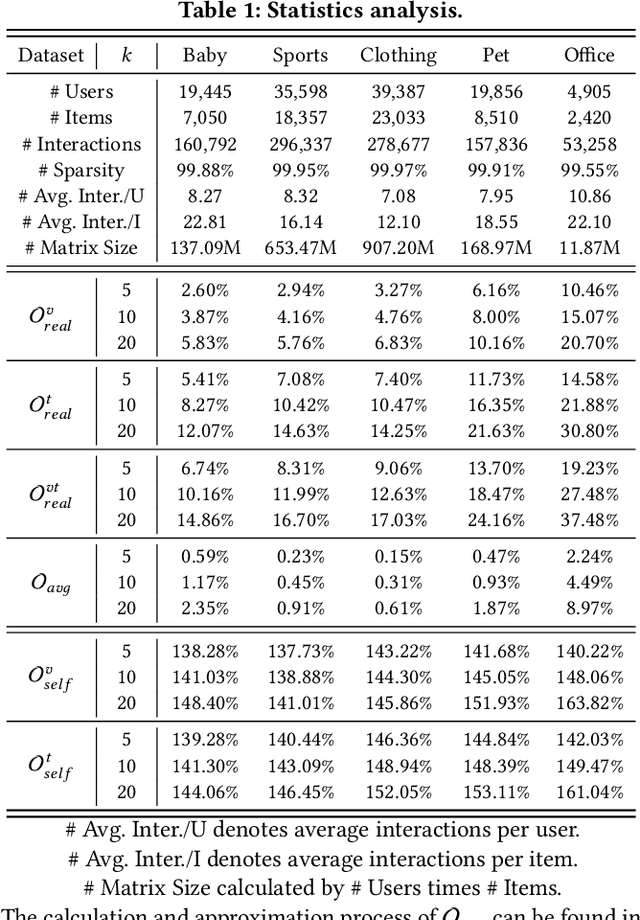
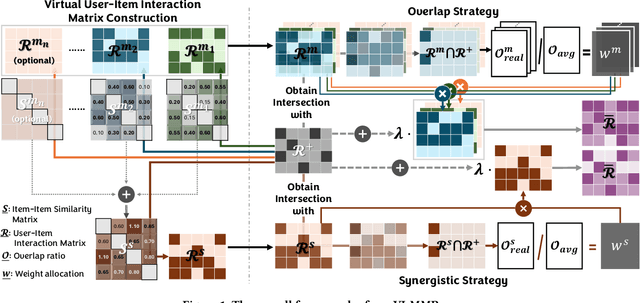

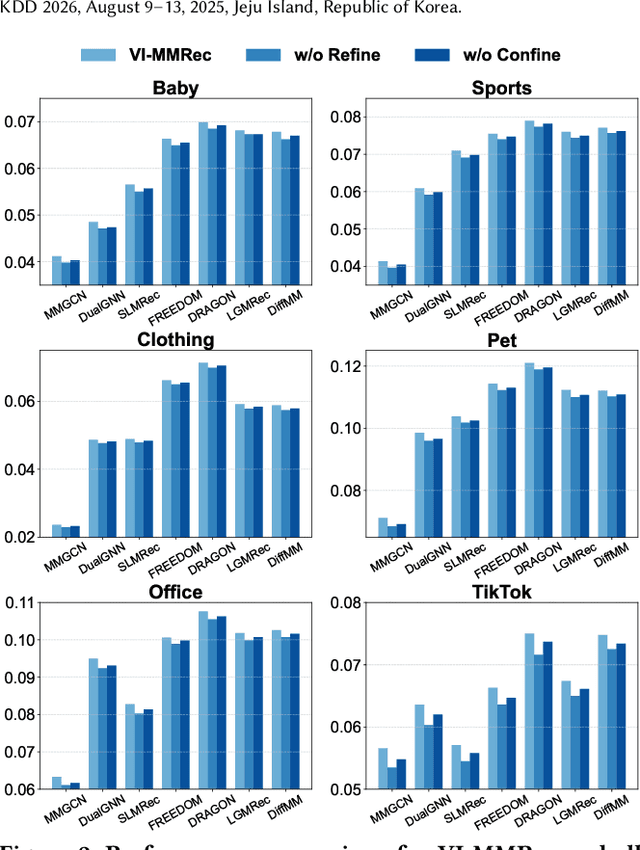
Abstract:Although existing multimodal recommendation models have shown promising performance, their effectiveness continues to be limited by the pervasive data sparsity problem. This problem arises because users typically interact with only a small subset of available items, leading existing models to arbitrarily treat unobserved items as negative samples. To this end, we propose VI-MMRec, a model-agnostic and training cost-free framework that enriches sparse user-item interactions via similarity-aware virtual user-item interactions. These virtual interactions are constructed based on modality-specific feature similarities of user-interacted items. Specifically, VI-MMRec introduces two different strategies: (1) Overlay, which independently aggregates modality-specific similarities to preserve modality-specific user preferences, and (2) Synergistic, which holistically fuses cross-modal similarities to capture complementary user preferences. To ensure high-quality augmentation, we design a statistically informed weight allocation mechanism that adaptively assigns weights to virtual user-item interactions based on dataset-specific modality relevance. As a plug-and-play framework, VI-MMRec seamlessly integrates with existing models to enhance their performance without modifying their core architecture. Its flexibility allows it to be easily incorporated into various existing models, maximizing performance with minimal implementation effort. Moreover, VI-MMRec introduces no additional overhead during training, making it significantly advantageous for practical deployment. Comprehensive experiments conducted on six real-world datasets using seven state-of-the-art multimodal recommendation models validate the effectiveness of our VI-MMRec.
Multi-modal Dynamic Proxy Learning for Personalized Multiple Clustering
Nov 10, 2025Abstract:Multiple clustering aims to discover diverse latent structures from different perspectives, yet existing methods generate exhaustive clusterings without discerning user interest, necessitating laborious manual screening. Current multi-modal solutions suffer from static semantic rigidity: predefined candidate words fail to adapt to dataset-specific concepts, and fixed fusion strategies ignore evolving feature interactions. To overcome these limitations, we propose Multi-DProxy, a novel multi-modal dynamic proxy learning framework that leverages cross-modal alignment through learnable textual proxies. Multi-DProxy introduces 1) gated cross-modal fusion that synthesizes discriminative joint representations by adaptively modeling feature interactions. 2) dual-constraint proxy optimization where user interest constraints enforce semantic consistency with domain concepts while concept constraints employ hard example mining to enhance cluster discrimination. 3) dynamic candidate management that refines textual proxies through iterative clustering feedback. Therefore, Multi-DProxy not only effectively captures a user's interest through proxies but also enables the identification of relevant clusterings with greater precision. Extensive experiments demonstrate state-of-the-art performance with significant improvements over existing methods across a broad set of multi-clustering benchmarks.
Think Socially via Cognitive Reasoning
Sep 26, 2025Abstract:LLMs trained for logical reasoning excel at step-by-step deduction to reach verifiable answers. However, this paradigm is ill-suited for navigating social situations, which induce an interpretive process of analyzing ambiguous cues that rarely yield a definitive outcome. To bridge this gap, we introduce Cognitive Reasoning, a paradigm modeled on human social cognition. It formulates the interpretive process into a structured cognitive flow of interconnected cognitive units (e.g., observation or attribution), which combine adaptively to enable effective social thinking and responses. We then propose CogFlow, a complete framework that instills this capability in LLMs. CogFlow first curates a dataset of cognitive flows by simulating the associative and progressive nature of human thought via tree-structured planning. After instilling the basic cognitive reasoning capability via supervised fine-tuning, CogFlow adopts reinforcement learning to enable the model to improve itself via trial and error, guided by a multi-objective reward that optimizes both cognitive flow and response quality. Extensive experiments show that CogFlow effectively enhances the social cognitive capabilities of LLMs, and even humans, leading to more effective social decision-making.
NLGCL: Naturally Existing Neighbor Layers Graph Contrastive Learning for Recommendation
Jul 10, 2025


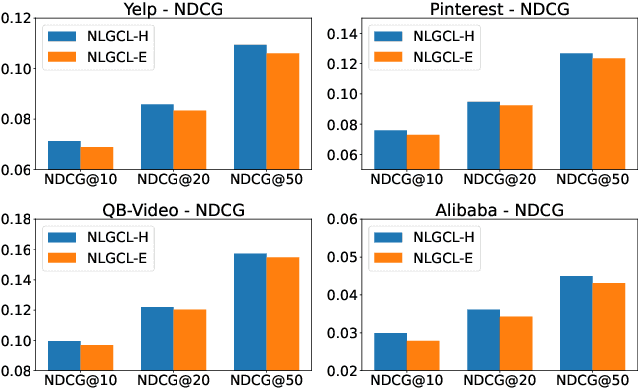
Abstract:Graph Neural Networks (GNNs) are widely used in collaborative filtering to capture high-order user-item relationships. To address the data sparsity problem in recommendation systems, Graph Contrastive Learning (GCL) has emerged as a promising paradigm that maximizes mutual information between contrastive views. However, existing GCL methods rely on augmentation techniques that introduce semantically irrelevant noise and incur significant computational and storage costs, limiting effectiveness and efficiency. To overcome these challenges, we propose NLGCL, a novel contrastive learning framework that leverages naturally contrastive views between neighbor layers within GNNs. By treating each node and its neighbors in the next layer as positive pairs, and other nodes as negatives, NLGCL avoids augmentation-based noise while preserving semantic relevance. This paradigm eliminates costly view construction and storage, making it computationally efficient and practical for real-world scenarios. Extensive experiments on four public datasets demonstrate that NLGCL outperforms state-of-the-art baselines in effectiveness and efficiency.
MDVT: Enhancing Multimodal Recommendation with Model-Agnostic Multimodal-Driven Virtual Triplets
May 22, 2025Abstract:The data sparsity problem significantly hinders the performance of recommender systems, as traditional models rely on limited historical interactions to learn user preferences and item properties. While incorporating multimodal information can explicitly represent these preferences and properties, existing works often use it only as side information, failing to fully leverage its potential. In this paper, we propose MDVT, a model-agnostic approach that constructs multimodal-driven virtual triplets to provide valuable supervision signals, effectively mitigating the data sparsity problem in multimodal recommendation systems. To ensure high-quality virtual triplets, we introduce three tailored warm-up threshold strategies: static, dynamic, and hybrid. The static warm-up threshold strategy exhaustively searches for the optimal number of warm-up epochs but is time-consuming and computationally intensive. The dynamic warm-up threshold strategy adjusts the warm-up period based on loss trends, improving efficiency but potentially missing optimal performance. The hybrid strategy combines both, using the dynamic strategy to find the approximate optimal number of warm-up epochs and then refining it with the static strategy in a narrow hyper-parameter space. Once the warm-up threshold is satisfied, the virtual triplets are used for joint model optimization by our enhanced pair-wise loss function without causing significant gradient skew. Extensive experiments on multiple real-world datasets demonstrate that integrating MDVT into advanced multimodal recommendation models effectively alleviates the data sparsity problem and improves recommendation performance, particularly in sparse data scenarios.
COHESION: Composite Graph Convolutional Network with Dual-Stage Fusion for Multimodal Recommendation
Apr 06, 2025



Abstract:Recent works in multimodal recommendations, which leverage diverse modal information to address data sparsity and enhance recommendation accuracy, have garnered considerable interest. Two key processes in multimodal recommendations are modality fusion and representation learning. Previous approaches in modality fusion often employ simplistic attentive or pre-defined strategies at early or late stages, failing to effectively handle irrelevant information among modalities. In representation learning, prior research has constructed heterogeneous and homogeneous graph structures encapsulating user-item, user-user, and item-item relationships to better capture user interests and item profiles. Modality fusion and representation learning were considered as two independent processes in previous work. In this paper, we reveal that these two processes are complementary and can support each other. Specifically, powerful representation learning enhances modality fusion, while effective fusion improves representation quality. Stemming from these two processes, we introduce a COmposite grapH convolutional nEtwork with dual-stage fuSION for the multimodal recommendation, named COHESION. Specifically, it introduces a dual-stage fusion strategy to reduce the impact of irrelevant information, refining all modalities using ID embedding in the early stage and fusing their representations at the late stage. It also proposes a composite graph convolutional network that utilizes user-item, user-user, and item-item graphs to extract heterogeneous and homogeneous latent relationships within users and items. Besides, it introduces a novel adaptive optimization to ensure balanced and reasonable representations across modalities. Extensive experiments on three widely used datasets demonstrate the significant superiority of COHESION over various competitive baselines.
Squeeze and Excitation: A Weighted Graph Contrastive Learning for Collaborative Filtering
Apr 06, 2025



Abstract:Contrastive Learning (CL) has recently emerged as a powerful technique in recommendation systems, particularly for its capability to harness self-supervised signals from perturbed views to mitigate the persistent challenge of data sparsity. The process of constructing perturbed views of the user-item bipartite graph and performing contrastive learning between perturbed views in a graph convolutional network (GCN) is called graph contrastive learning (GCL), which aims to enhance the robustness of representation learning. Although existing GCL-based models are effective, the weight assignment method for perturbed views has not been fully explored. A critical problem in existing GCL-based models is the irrational allocation of feature attention. This problem limits the model's ability to effectively leverage crucial features, resulting in suboptimal performance. To address this, we propose a Weighted Graph Contrastive Learning framework (WeightedGCL). Specifically, WeightedGCL applies a robust perturbation strategy, which perturbs only the view of the final GCN layer. In addition, WeightedGCL incorporates a squeeze and excitation network (SENet) to dynamically weight the features of the perturbed views. Our WeightedGCL strengthens the model's focus on crucial features and reduces the impact of less relevant information. Extensive experiments on widely used datasets demonstrate that our WeightedGCL achieves significant accuracy improvements compared to competitive baselines.
Don't Lose Yourself: Boosting Multimodal Recommendation via Reducing Node-neighbor Discrepancy in Graph Convolutional Network
Dec 25, 2024Abstract:The rapid expansion of multimedia contents has led to the emergence of multimodal recommendation systems. It has attracted increasing attention in recommendation systems because its full utilization of data from different modalities alleviates the persistent data sparsity problem. As such, multimodal recommendation models can learn personalized information about nodes in terms of visual and textual. To further alleviate the data sparsity problem, some previous works have introduced graph convolutional networks (GCNs) for multimodal recommendation systems, to enhance the semantic representation of users and items by capturing the potential relationships between them. However, adopting GCNs inevitably introduces the over-smoothing problem, which make nodes to be too similar. Unfortunately, incorporating multimodal information will exacerbate this challenge because nodes that are too similar will lose the personalized information learned through multimodal information. To address this problem, we propose a novel model that retains the personalized information of ego nodes during feature aggregation by Reducing Node-neighbor Discrepancy (RedN^nD). Extensive experiments on three public datasets show that RedN^nD achieves state-of-the-art performance on accuracy and robustness, with significant improvements over existing GCN-based multimodal frameworks.
AlignGroup: Learning and Aligning Group Consensus with Member Preferences for Group Recommendation
Sep 04, 2024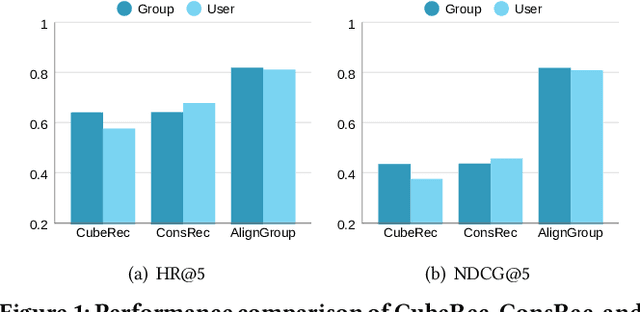

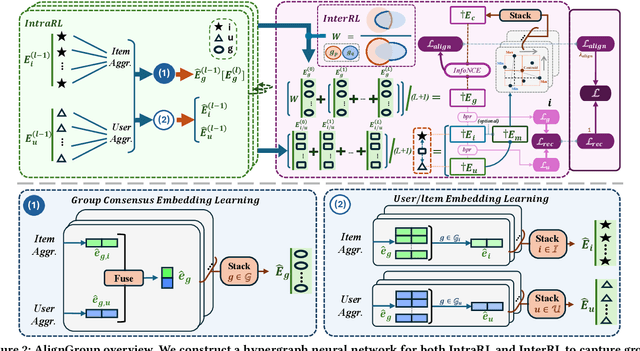

Abstract:Group activities are important behaviors in human society, providing personalized recommendations for groups is referred to as the group recommendation task. Existing methods can usually be categorized into two strategies to infer group preferences: 1) determining group preferences by aggregating members' personalized preferences, and 2) inferring group consensus by capturing group members' coherent decisions after common compromises. However, the former would suffer from the lack of group-level considerations, and the latter overlooks the fine-grained preferences of individual users. To this end, we propose a novel group recommendation method AlignGroup, which focuses on both group consensus and individual preferences of group members to infer the group decision-making. Specifically, AlignGroup explores group consensus through a well-designed hypergraph neural network that efficiently learns intra- and inter-group relationships. Moreover, AlignGroup innovatively utilizes a self-supervised alignment task to capture fine-grained group decision-making by aligning the group consensus with members' common preferences. Extensive experiments on two real-world datasets validate that our AlignGroup outperforms the state-of-the-art on both the group recommendation task and the user recommendation task, as well as outperforms the efficiency of most baselines.
 Add to Chrome
Add to Chrome Add to Firefox
Add to Firefox Add to Edge
Add to Edge